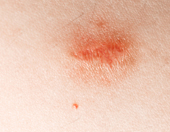Treatment Options by Stages for Melanoma
There are different types of treatments available for patients with melanoma. Some treatments are standard (those currently being used), and some are being tested in clinical trials. A clinical trial is a research study meant to either obtain information on new treatments, or to improve on current treatments. Some clinical trials are only open to patients who have not started any treatment yet, so you might want to think about taking part in such trials.
We have included a link to a list of current clinical trials for each section, though there may not be a trial listed for some types or stages of cancer. You can always check with your dermatologist for more up-to-date lists of clinical trials in your area that may not be listed below, but may be helpful to you in your particular situation.
Stage 0 (Melanoma in Situ)
Stage I Melanoma
Stage II Melanoma
Stage III Melanoma
Stage IV and Recurrent Melanoma
Stage 0 (Melanoma in Situ)
Treatment for stage 0 melanoma is usually a simple removal of the abnormal cells and a small amount of tissue around those cancerous cells. This form of melanoma is easily treated. However, melanoma tends to reoccur in most patients.
Stage I Melanoma
Stage I melanoma treatment is a little more complicated then stage 0, and it may include:
- Surgery to remove the tumor and some of the normal tissue surrounding it
- Lymph node mapping and removal of the lymph node if necessary
Stage II Melanoma
As you can see, as the stages increase, the treatments also increase in intensity. Treatment for stage II melanoma is more detailed than those of stages 0 and I. Stage II melanoma treatments may include:
- Surgery to remove the tumor and some normal tissue surrounding it
- Lymph node mapping and sentinel lymph node biopsy, followed by surgery to remove the tumor and some of the surrounding tissue
- If cancer is found in the sentinel lymph node, then a second surgery might be needed to remove more nearby lymph nodes.
Stage III Melanoma
Surgical treatment of melanoma in stage III includes:
- Surgery to remove the tumor and some normal tissue surrounding it. Your doctor may also choose to do a skin graft in order to cover the wound caused by the surgery.
- Surgery is followed by biologic therapy with interferon if there is a high risk that the cancer will return.
If stage III melanoma cannot be removed by surgery, treatment may include:
- Targeted therapy with Ipilimumab or Vemurafenib
- Regional chemotherapy (Hyperthermic isolated limb perfusion).
- Biologic therapy with tumor necrosis factor may also be needed for some patients.
Some treatments that are being studied in clinical trials for stage III melanoma include:
- New kinds of treatments to be used after surgery
- Injections such as Oncolytic virus therapy that go into the tumor
- Systemic chemotherapy
Stage IV and Recurrent Melanoma
Stage IV and recurrent melanoma treatments may include:
- Targeted therapy with Ipilimumab or Vemurafenib
- Biologic therapy with interleukin-2 (IL-2)
- Chemotherapy
- Palliative therapy to relieve symptoms and improve the quality of life. This may include:
- Surgery to remove lymph nodes or tumors in the lung, GI tract, bone or brain
- Radiation therapy to the brain, spinal cord or bone
- A clinical trial of new therapy of combination of therapies
There are other treatments that are being studied in clinical trials for stage IV and recurrent melanoma that include:
- New biologic therapy agents
- Targeted therapy with other signal transduction inhibitors
- Angiogenesis inhibitors
- Injections into the tumor, such as Oncolytic virus therapy
- Surgery to remove all known cancer
Why Participate in Clinical Trials
Taking part in a clinical trial is simply the best choice for some patients. Clinical trials are part of the process when it comes to cancer research. These trials are done to find out if new cancer treatments are safe and effective, or if they are better than the current standard treatments. Today’s standard treatments are based on yesterday’s clinical trials. Patients who take part in clinical trials may be among the first to receive new treatment, or they could simply receive standard treatment.
Also, patients who participate in clinical trials help to improve the way cancer will be treated in the future. Even if these clinical trials do not lead to effective new treatments, they often answer questions important to help move research forward. Patients can enter clinical trials before, during, or after starting their cancer treatment.
While some clinical trials only include patients who have not yet received treatment, other trials test and treat patients whose cancer has not gotten better with standard methods. Some clinical trials test new ways to stop cancer from recurring, or reduce the side effects of cancer treatments. Clinical trials are taking place in many parts of the country. See the treatment options section for links to current clinical trials.

